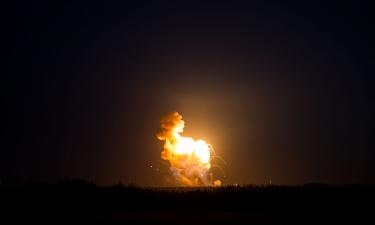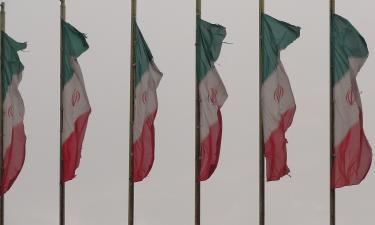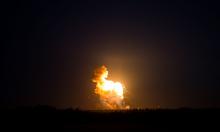Putin reshuffles government, possibly promoting his successor
President Vladimir Putin on Thursday promoted hawkish Defense Minister Sergei Ivanov to first deputy prime minister in a reshuffle just over a year before presidential elections in which the close Putin ally is seen as a top contender.
The shift puts Ivanov in the same position as Dmitry Medvedev, who is seen as his chief rival to succeed Putin. Anatoly Serdyukov, until now head of the federal tax agency, replaces Ivanov as defense minister.
Putin praised Ivanov in a televised announcement, saying he "has fulfilled the tasks he faced as Defense Minister and fulfilled them successfully." He said Ivanov's duties would be broadened to include oversight of defense and some civilian industries, and that staying on as defense minister would be too much.
"He cannot carry out the defense minister's responsibilities - it's impossible to sit in two chairs," said Putin, who came out with further praise of a beaming Ivanov in a meeting with top Defense Ministry officials shown on state-run television.
Putin said he named Serdyukov, a longtime tax collection official with no military experience, as defense minister because a sweeping arms modernization program planned through 2015 requires an appointee with strong economic and financial experience.
Ivanov had been one of a number of deputy prime ministers, while Medvedev was the sole first deputy prime minister. The two men are given lavish coverage by state-run television and are clearly being groomed by the Kremlin for potential presidential runs to succeed Putin in the March 2008 election.
The popular Putin is barred from a third consecutive term by the Constitution, but has suggested he may back a favored successor as the vote draws nearer. A candidate with Putin's support would have a massive advantage over rivals.
Ivanov's promotion puts him on the same level with Medvedev and could also boost his image by distancing him from the military, which faces persistent criticism over rampant abuse of young conscripts by older soldiers and other crimes.
"Ivanov has not won kudos as defense minister," said Yevgeny Volk, the head of the Moscow office of the U.S.-based think tank, the Heritage Foundation. "Now he has finally got rid of these nets that dragged him to the bottom and has been given a good, clean job."
Volk said the reshuffle signaled Putin's apparent intention to even up Ivanov's chances in competition with Medvedev, whose once-low profile has been boosted since Putin put him in charge of 'national projects' envisaging housing improvements and funding increases for education and health care.
Both Ivanov and Medvedev are among the many officials whose ties with Putin reach back to his native St. Petersburg, but they represent different parts of that milieu - and possible different courses for Russia's future.
Medvedev is a former lawyer and law teacher who recently courted the West as leader of the Russian delegation at economic meetings in Davos, Switzerland. Ivanov, a colleague of Putin's in the Soviet-era KGB, shares the president's chilly criticism of U.S. foreign policy and his blustery warnings to the West, the AP reports.
Ivanov would apparently remain in charge of Russia's lucrative arms trade, which has provoked widespread international criticism for dealings with Iran and the alleged supply of Russian weapons to Hezbollah militants.
Volk said that Ivanov's oversight of the weapons trade would allow the Kremlin to consolidate financial flows. "Arms trade, along with energy revenues, will be a major source for the election campaign, and it's essential (for Putin) to have his own person here," Volk said.
Yuri Korgunyuk, a top analyst with the independent INDEM think tank, said the reshuffle was Putin's way of reaffirming his dominance of the political scene.
"Formally speaking, it's a promotion for Ivanov, but he remains just a pawn," he said. "It will be up to Putin to decide whether to make this pawn a queen."
Volk also said it was too early to say whether Putin was inclined to anoint Ivanov as a preferred successor. "It's all unpredictable, we may see other candidates," he said.
Accused in the West of backsliding on democracy, Putin has sought to dispel the impression that the Kremlin will engineer a transfer of power, emphasizing in an annual news conference this month that three would be no "successor" but instead "candidates" in a democratic election.
In comments posted on news Web site strana.ru, Kremlin-connected political analyst Sergei Markov said Ivanov's promotion signaled the emergence of "precisely those two candidates who will participate in the upcoming presidential election."
Rival candidates from the Kremlin camp would allow Putin to preserve the continuity he says is necessary to maintain stability and growth, and to ensure an ally takes the helm while also creating the impression a more legitimate transfer of power.
Korgunyuk said that by shifting the tax chief Serdyukov to the defense minister's job, Putin wanted to tighten controls over the top brass accused of corruption and inefficiency. "Putin put the tax man in charge of the Defense Ministry to combat theft," he said.
Putin also said he named Sergei Naryshkin a vice-premier in charge of coordinating government activity on foreign trade, primarily with other former Soviet republics. Russia has been embroiled in disputes with several neighbors that have hurt its image in the West.
Naryshkin had been the Cabinet chief-of-staff.
Subscribe to Pravda.Ru Telegram channel, Facebook, RSS!





